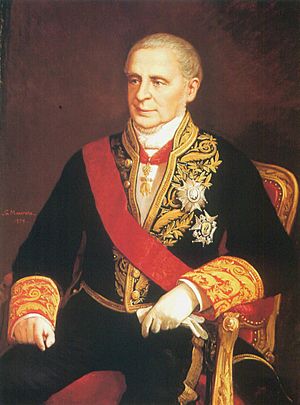Manuel de Pando, 6th Marquess of Miraflores facts for kids
Quick facts for kids
The Most Excellent
The Marquess of Miraflores
|
|
|---|---|
 |
|
| Prime Minister of Spain | |
| In office 2 March 1863 – 17 January 1864 |
|
| Monarch | Isabella II |
| Preceded by | Leopoldo O'Donnell |
| Succeeded by | Lorenzo Arrazola |
| Personal details | |
| Born |
Manuel de Pando y Fernández de Pinedo
|
| Nationality | Spanish |
Manuel de Pando y Fernández de Pinedo, 6th Marquess of Miraflores, 4th Count of la Ventosa (born December 22, 1792 – died February 20, 1872) was an important Spanish noble and politician. He served as Prime Minister of Spain two times. He also held other key roles, like being the Minister of State (which is like a foreign minister) and the President of the Senate.
Contents
Manuel de Pando's Early Life
Manuel de Pando was born in Madrid, the capital of Spain. He spent time studying agriculture and industry. These studies helped him understand how to improve farming and businesses.
Joining the Fight for Spain
When he was young, Spain was going through a tough time. He took part in the Dos de Mayo Uprising. This was a big event during the War of Spanish Independence. This war was fought against French rule. Because of the fighting, Manuel and his family had to leave their home and move to Cádiz.
After the war, Ferdinand VII of Spain became king. The king's uncle, Infante Antonio Pascual of Spain, asked Manuel for help. Manuel advised him on writing the "Memorial of Miraflores." This document aimed to fix problems in Spain after the French left.
Years of Change and Action
In 1820, Manuel joined the National Militia. This was a group of citizens who helped keep order. He worked with General Rafael Riego. However, he left the militia two years later. This helped him avoid problems during a difficult period called the "Década Ominosa" (1823–1833).
Manuel de Pando's Return to Politics
Manuel de Pando returned to public life in 1832. He supported the regent Maria Cristina of Spain and the future Queen Isabella II. A regent is someone who rules when the king or queen is too young.
A Diplomat for Spain
In 1834, he became a Spanish representative in London. This meant he worked as a diplomat. He played a big part in signing the 1834 Quadruple Alliance. This was an important agreement between Spain, France, Portugal, and the United Kingdom. It showed how countries worked together to solve problems.
After his time in London, he came back to Spain. He held several important jobs. At one point, he had to go to France because of a political event called the Revolt of La Granja de San Ildefonso.
When he returned home, Manuel helped create a new constitution. He also took part in the Convention of Vergara. This agreement helped end the First Carlist War, which was a civil war in Spain.
Leading Spain: Prime Minister and Minister of State
On February 12, 1846, Manuel de Pando became the Minister of State. This role is similar to a foreign minister today. He wanted to bring back good values and help people get along. However, his ideas were not supported by the previous leader, General Ramón María Narváez. Also, the regent Maria Cristina's actions caused problems. Manuel resigned on March 16, and Narváez took his place.
President of the Senate
From 1845 to 1862, Manuel de Pando was the president of the Spanish Senate. The Senate is a part of the government that helps make laws. This was a very long time to hold such an important position.
After Queen Isabella II married Francis, Duke of Cádiz, Manuel became the Governor of the Royal Palace. He worked to improve how the palace was managed.
Helping Spain on the World Stage
During the time when Juan Bravo Murillo was prime minister, Manuel de Pando again served as Minister of State (1851–1852). In this job, he got help from France and Britain to protect Cuba. Cuba was a Spanish territory at the time.
In 1853, Queen Isabella asked him to be prime minister again. He held this important position until 1864. After that, he was once more the President of the Senate from 1866 to 1867.
Manuel de Pando died in Madrid, Spain, in 1872. He was a key figure in Spanish politics during a time of many changes.
| Political offices | ||
|---|---|---|
| Preceded by Ramón María Narváez |
Prime Minister of Spain 12 February 1846 – 16 March 1846 |
Succeeded by Ramón María Narváez |
| Preceded by Francisco de Paula Martínez de la Rosa |
Minister of State 12 February 1846 – 16 March 1846 |
|
| Preceded by Manuel Bertrán de Lis |
Minister of State 23 May 1851 – 7 August 1852 |
Succeeded by Manuel Bertrán de Lis |
| Preceded by The Duke of Tetuan |
Prime Minister of Spain 2 March 1863 – 17 January 1864 |
Succeeded by Lorenzo Arrazola |
| Preceded by The Duke of la Torre |
Minister of State 2 March 1863 – 17 January 1864 |
|
Images for kids
See also
 In Spanish: Manuel Pando Fernández de Pinedo para niños
In Spanish: Manuel Pando Fernández de Pinedo para niños
 | Emma Amos |
 | Edward Mitchell Bannister |
 | Larry D. Alexander |
 | Ernie Barnes |


